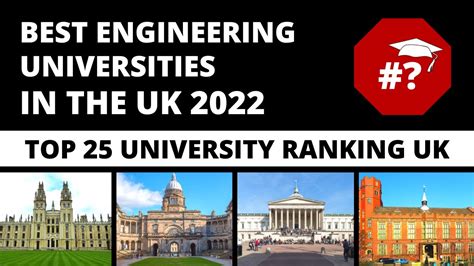Choosing the right engineering university is a critical decision that can significantly impact your future career prospects. With so many institutions to choose from, it can be challenging to know which ones are the best. This comprehensive ranking provides a detailed analysis of the top engineering universities worldwide, helping you make an informed decision about your education and future.

Factors Considered in the Ranking
This ranking is based on a rigorous evaluation of various factors that are essential for a high-quality engineering education, including:
- Academic Reputation: The university’s reputation for excellence in engineering research and teaching.
- Faculty Quality: The qualifications, experience, and research accomplishments of the faculty.
- Student-to-Faculty Ratio: The number of students per faculty member, which impacts the level of personalized attention students receive.
- Research Funding: The amount of funding the university receives for engineering research, indicating its commitment to innovation.
- Career Outcomes: The success of graduates in securing jobs and salaries in the engineering field.
- Industry Partnerships: The university’s collaborations with industry leaders, providing students with valuable internship and networking opportunities.
Top 10 Engineering Universities
Based on these factors, the following universities emerged as the top 10 engineering universities globally:
| Rank | University | Country |
|---|---|---|
| 1 | Massachusetts Institute of Technology (MIT) | United States |
| 2 | Stanford University | United States |
| 3 | University of Cambridge | United Kingdom |
| 4 | University of Oxford | United Kingdom |
| 5 | California Institute of Technology (Caltech) | United States |
| 6 | ETH Zurich – Swiss Federal Institute of Technology | Switzerland |
| 7 | Princeton University | United States |
| 8 | University of Tokyo | Japan |
| 9 | University of California, Berkeley | United States |
| 10 | National University of Singapore | Singapore |
Why Engineering University Ranking Matters
Choosing a top-ranked engineering university has numerous benefits:
- Enhanced Academic Experience: Top universities offer cutting-edge curriculum, state-of-the-art facilities, and renowned faculty, providing students with an exceptional educational experience.
- Higher Employment Rates: Graduates from highly ranked universities typically have higher employment rates and salaries.
- Prestige and Reputation: A degree from a top-ranked university carries significant prestige and reputation, opening doors to career opportunities worldwide.
- Global Recognition: Top universities attract students and faculty from diverse backgrounds, fostering a global perspective and enhancing students’ international connections.
- Exceptional Research Opportunities: Leading universities invest heavily in research and provide students with opportunities to participate in groundbreaking projects.
Common Mistakes to Avoid
When researching engineering universities, it is essential to avoid the following common mistakes:
- Relying solely on rankings: While rankings provide valuable information, it is important to consider individual factors such as academic interests, career goals, and personal preferences.
- Focusing only on the highest-ranked universities: Top-ranked universities often have rigorous admission requirements and may not be the best fit for all students.
- Ignoring industry partnerships: Industry collaborations provide invaluable opportunities for internships, research projects, and career networking.
- Overlooking student life and diversity: Consider the university’s campus culture, student support services, and commitment to diversity when making your decision.
- Applying blindly: Research thoroughly and identify universities that align with your interests, values, and career aspirations.
FAQs
1. How do I improve my chances of getting into a top engineering university?
– Excel in high school courses, especially math and science.
– Participate in extracurricular activities that showcase your STEM interests.
– Seek mentorship from engineering professionals.
– Prepare thoroughly for standardized tests.
2. What are the emerging trends in engineering education?
– AI and machine learning integration into curriculum.
– Focus on sustainability and environmental consciousness.
– Project-based learning and hands-on experience.
– Collaboration with industry to bridge theory and practice.
3. How can I envision novel applications of engineering principles?
– Explore the concept of “biomimicry,” where engineering solutions are inspired by biological systems.
– Utilize design thinking to generate creative ideas.
– Collaborate with students from diverse backgrounds to cross-pollinate ideas.
– Leverage artificial intelligence tools to process data and identify patterns.
4. What are the most important qualities to look for in a engineering program?
– Strong academic reputation and faculty experience.
– State-of-the-art facilities and cutting-edge research.
– Industry partnerships and internship opportunities.
– Commitment to diversity and inclusion.
– Supportive learning environment and student support services.
5. How can I stand out in the job market as an engineering graduate?
– Develop strong technical skills and a solid theoretical foundation.
– Gain practical experience through internships and research projects.
– Build a professional network by attending industry events and connecting with professionals.
– Showcase your communication and interpersonal skills.
– Stay updated with the latest technological advancements in your field.
6. What are the key factors to consider when choosing an engineering specialization?
– Personal interests and career aspirations.
– Job market demand and salary potential.
– Availability of internships and research opportunities.
– Alignment with university strengths and research focus.
– Potential for interdisciplinary collaborations.
7. What are the benefits of studying engineering abroad?
– Global perspective and cross-cultural experiences.
– Exposure to different educational systems and teaching methods.
– Opportunities to build international connections and networks.
– Enhanced employability in a globalized job market.
– Personal growth and development through immersion in a new culture.
8. How can I prepare for the future of engineering?
– Embrace lifelong learning and continuous professional development.
– Develop adaptability and flexibility to navigate technological advancements.
– Focus on problem-solving skills and creative thinking.
– Collaborate with engineers from different disciplines.
– Stay informed about emerging trends and research in the field.
